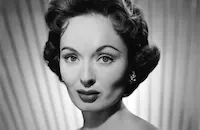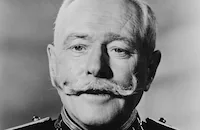The Golden Horde
Brief Synopsis
Cast & Crew
George Sherman
Ann Blyth
David Farrar
George Macready
Henry Brandon
Howard Petrie
Film Details
Technical Specs

Synopsis
In 1220, barbarian leader Genghis Khan leads the most ruthless military force in history, known as the Golden Horde, on a rampage through Persia to the ancient nation of Samarkand. Khan, ignoring a prophesy decreeing that anyone who tries to destroy Samarkand will himself be destroyed, sends both his son Juchi and his ally, Tugluk, the Kalmuk king, to burn and pillage the city. Simultaneously, a group of English Crusaders, led by the fearless Sir Guy, arrive to warn Khan that their Christian god will triumph over his evil ways. On their way to the city, they meet Samarkand military captain Herat, who presents them to the city's ruler, Princess Shalimar, and gives them the unhappy news that the Horde has defeated their army. Although Shalimar, who is scheming to embroil Juchi and Tugluk in a romantic rivalry that will destroy them both, banishes Guy to the hills with the rest of the palace inhabitants, Guy believes she is weak and silly and insists on staying to protect her. Soon the Horde leaders arrive and Shalimar has her astrologer fabricate a prophesy that a conquerer who comes from the East will marry the princess and rule the world. This, together with Shalimar's beauty, enthralls the combatant leaders, who are kept from killing each other only by Khan's shaman, Raven. Before Shalimar can continue with her plan, however, Guy's men attack, and Shalimar is forced to flee to her ancestors' tombs beneath the palace. Guy finds her there, and she offers to show his men the secret underground catacombs that lead into the hills if he goes there and protects her people. She is annoyed when he arrogantly kisses her, but he soon becomes indispensable to her after Raven decrees that the battle between Juchi and Tugluk will be decided by Khan himself, and sends a messenger to the leader asking for his decision. Guy's men, who are expert archers, kill the messenger on his route, and as a result, Shalimar gains a few days in which to beguile Juchi and Tugluk further. Meanwhile, Khan grows tired of waiting for word from his men and sends his own message stating he is bringing the rest of the army to Samarkand himself. Although Guy's men try to kill this messenger, he reaches Raven, who realizes that Guy's men are in the hills. Shalimar's handmaiden, Lailee, overhears Raven lie to Juchi and Tugluk that Khan wants Samarkand burnt to the ground and Shalimar murdered, and the princess escapes into the hills. There, Guy haughtily convinces her that his military plan is superior to hers, and a romance blooms between them. Desperate to save her people, however, Shalimar sneaks back into the palace that night to continue her scheme. She tells Tugluk that Raven has tricked him, and he raises his army to take over the palace, killing Juchi and wounding Raven in the process. As he feasts in celebration of his victory, Shalimar poisons his wine, but before he can drink it, Guy arrives to save her. The Kalmuks fight Guy's men, but the Crusaders fend them off, and in a final sword fight, Guy kills Tugluk. Soon after, Khan arrives, and Guy drags the dying Raven to the city's gate to warn Khan that the city is, indeed, cursed. Khan stabs Raven but realizes that a power even greater than his is at work and withdraws his army. Guy embraces Shalimar and vows to help rebuild her city.

Director
George Sherman
Cast

Ann Blyth

David Farrar

George Macready

Henry Brandon
Howard Petrie

Richard Egan
Donald Randolph

Peggie Castle
Poodles Hanneford
Lucille Barkley
Karen Varga
Leon Belasco
Robert Hunter
Mai Tai Sing
Alex Sharp
Grandon Rhodes
George J. Lewis

Gregg Barton
Buddy Roosevelt
Kenneth Garcia
Hugh Prosser
Robert Dane
Ed Loredo
Myron Marks
Aen-ling Chow
Don Summers
Crew
Gerald Drayson Adams
Glenn Anderson
Robert Arthur
Harold Belfer
Leslie I. Carey
Howard Christie
Eddie Dodds
William Fritzsche
Russell A. Gausman
Alexander Golitzen
Frank Gross
Julia Heron
Bernard Herzbrun
Glen Johnson
Alice Krasia
Harold Lamb
Lew Leary
Russell Metty
Leah Rhodes
Hans J. Salter
Frank Shaw
Tommy Shaw
Joan St. Oegger
Bill Swartz
Bud Westmore

Film Details
Technical Specs

Quotes
Trivia
Notes
According to a February 1951 New York Times article, writer Harold Lamb wrote The Golden Horde at the suggestion of Universal producer Robert Arthur, who received co-producer credit even though he had left the studio by the time the film was released. The article also details how the film's scenery was made to appear panoramic through the use of mini-perspective paintings which blocked out the upper part of the camera.
British star David Farrar made his American feature film debut in this picture, as did Chinese dancer Mai Tai Sing. Hollywood Reporter reported in January 1951 that Alice Krasia, a ballet teacher and Ann Blyth's stand-in, also made her debut, but her appearance in the final film has not been confirmed. According to a Hollywood Reporter news item, Charles Drake was cast, but he did not appear in the final film. In addition, Hollywood Reporter news items state that Larry McGrath was cast in the film, but his appearance has not been confirmed. A January 4, 1951 Hollywood Reporter news item noted that The Golden Horde marked the first time that father-and-son assistant directors Frank and Tommy Shaw worked together on the same film. Some scenes were shot at Furnace Creek and other Death Valley, CA locations.












